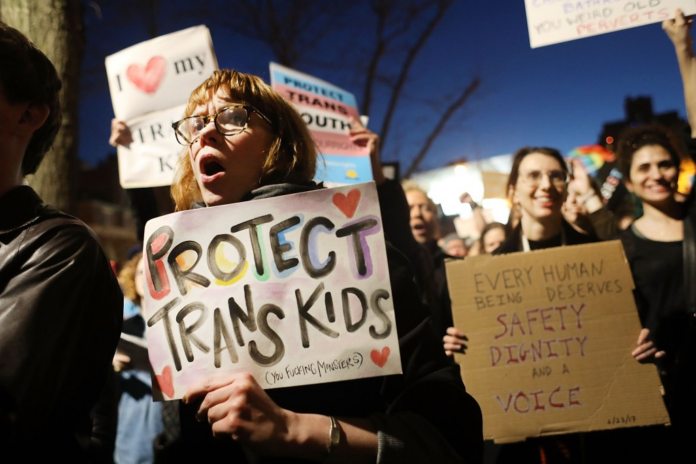The New York Civil Liberties Union argued Tuesday that a judge should suspend Nassau County’s sports ban on transgender women and girls.
The civil liberties group made its case in a court more than 10 weeks after Nassau County issued the ban, which forbids transgender women and girls from participating in sports consistent with their gender identity at about 100 county-run facilities.
The NYCLU has asked a Nassau County Supreme Court justice, Francis Ricigliano, to issue an order freezing the ban as litigation plays out.
In March, the civil liberties organization sued Nassau County, arguing that the ban violates state law. The NYCLU filed the complaint on behalf of a Nassau County women’s roller derby league.
The lawsuit said the league, the Long Island Roller Rebels, has at least one member who could be barred from playing under the ban. The complaint said the ban was issued against a “backdrop of clear statutory protections, regulations and guidance” preventing discrimination on the basis of gender identity in publicly operated athletic facilities.
The lawsuit cited a 2019 state law, the Gender Expression Non-Discrimination Act, which prohibits “discrimination based on gender identity or expression” in public spaces.
The Democratic state lawmaker who wrote the 2019 law, Sen. Brad Hoylman-Sigal of Manhattan, has sided with the NYCLU.
“It’s very clear,” he said by phone Tuesday. “You can’t discriminate against New Yorkers — whether they be adults or children — based on their gender identity or expression.”
Nassau County, which tried unsuccessfully to move the case to federal court, has asked the state court to dismiss the complaint. The county has argued in court documents that the ban is supported by the protections for women enshrined in the Equal Protection Clause of the U.S. Constitution’s 14th Amendment.
In recent decades, federal courts have sometimes applied the clause — with limited sweep — to questions of gender discrimination. The 14th Amendment, a broadly written Reconstruction era amendment aimed at preventing racial discrimination, dictates that no state shall “deny to any person within its jurisdiction the equal protection of the laws.”
Nassau County Executive Bruce Blakeman, a Republican, has said he issued his ban to prevent transgender women and girls from gaining an unfair competitive advantage in sports. He has struggled to cite an example of such an issue surfacing in his county, but has presented the ban as a preventative measure.
He has said the county wanted to “get ahead of the curve.”
BLAKEMAN_PENNY
In an April court filing, Nassau County suggested that federal protections should be applied to “biological” women in sports, and that those protections should supersede competing protections for transgender women in state laws.
“To the extent that these sections of New York State law unfairly and unequally afford opportunities to compete and excel to transgender females while discriminating against and denying identical opportunities to physiologically different biological woman,” the complaint said, “they are in irreconcilable conflict with the Equal Protection Clause of the federal constitution.”
Gabriella Larios, an NYCLU lawyer leading the lawsuit, said in an interview Tuesday that the argument is not one “that other courts around the country have bought” and that a federal court had determined in a separate case that the county had failed to prove that quashing the ban would violate the Equal Protection Clause.
In the federal case, Nassau County sued the state attorney general, Letitia James, in a bid to prevent her from bringing a lawsuit over the ban.
A federal judge dismissed the case last month. The judge, Nusrat Choudhury, wrote that the county’s claims based on the equal protection rights of women and girls were “unpersuasive.”
James, a Democrat, has not sued Nassau County. But she has panned the ban as “transphobic and blatantly illegal.”
In recent years, Republicans have pursued transgender bans in athletics, presenting them as efforts to preserve fairness in competition. Democrats say the measures are cruel and potentially dangerous to transgender youth, who report alarmingly high rates of depression.




